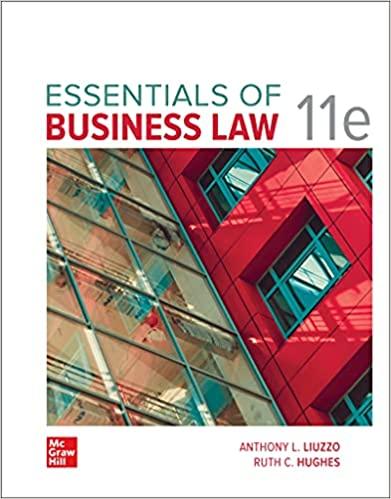Question
41.) Which statement best describes the extraterritorial application of U.S. antitrust laws? A. U.S. antitrust laws do not have extraterritorial application. B. U.S. antitrust laws
41.) Which statement best describes the extraterritorial application of U.S. antitrust laws?
A. U.S. antitrust laws do not have extraterritorial application.
B. U.S. antitrust laws have extraterritorial application, but U.S. courts have not been in full agreement about how far jurisdiction should extend.
C. U.S. antitrust laws have extraterritorial application if the defendant has its principal offices in the United States.
D. U.S. antitrust laws have extraterritorial application only if there is a global trade agreement in place.
42.) Gigglethorpe Co., whose principal office is in the United States, paid money to Snarf, an official in a foreign country. In which of the following cases is Gigglethorpe least likely to be found to have violated the Foreign Corrupt Practices Act?
A. The money was paid with the intent to corrupt Snarf.
B. The money was paid in order to have Snarf do something he would not have normally been obligated to do.
C. The money was paid in order to get Snarf to do his normal job more quickly and efficiently than he was already performing.
D. The money was paid in order to influence Snarf to make a choice, among the options open to him, that would be favorable to Gigglethorpe.
43.) Imagine that the government of Saudi Arabia operates its own airline. The airline is run as a business and it makes a profit. Now imagine that the airline defaults on several loans made to it by U.S. banks. If the U.S. banks sue the Saudi government for the loan default, is the doctrine of sovereign immunity likely to prevent the U.S. courts from hearing the case?
A. Yes, because nations cannot be sued unless they have voluntarily given up their immunity.
B. No, because the government was engaged in a commercial, rather than political activity.
C. Yes, because the government was engaged in a commercial, rather than political activity.
D. No, because sovereign immunity merely prevents citizens of a country from suing their own government; it does not prevent residents of other countries from suing that government.
44.) Mai Phoung, a U.S. citizen, wants to sue the government of China for breach of contract. She would like to sue China in the International Court of Justice. What, if any, obstacles stand in the way of this suit?
A. Mai Phoung cannot sue by herself; she must convince the U.S. government to present the claim.
B. If the government of China does not agree to be bound by the court's decision, then the court will have no jurisdiction to hear the claim.
C. The International Court of Justice does not hear contract claims.
D. (A) and (B)
E. (A), (B), AND (C).
45.) FCPA stands for ____________________________________.
True or False
46.) Under the supremacy clause, if a state and a federal law regulate the same subject matter, the state law will automatically be preempted.
47.) The equal protection clause applies to governmental and private actions.
48.) The compelling state interest/strict scrutiny test is used by the court to determine the constitutionality of government classifications based on race or a governmental action that unduly burdens a fundamental right.
49.) Administrative regulations are generally not subject to judicial review.
50.) Under an Equal Protection analysis, courts classify gender as a "suspect class."
Step by Step Solution
There are 3 Steps involved in it
Step: 1

Get Instant Access to Expert-Tailored Solutions
See step-by-step solutions with expert insights and AI powered tools for academic success
Step: 2

Step: 3

Ace Your Homework with AI
Get the answers you need in no time with our AI-driven, step-by-step assistance
Get Started


